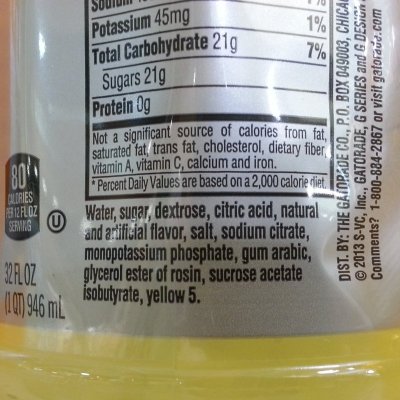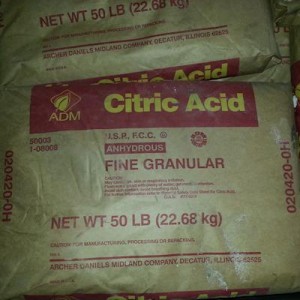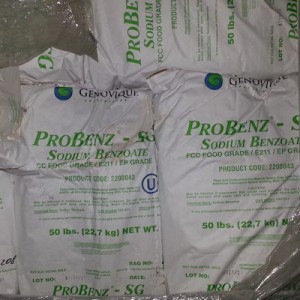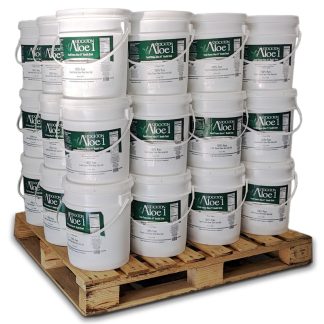
“WHAT IS THE PURPOSE OF PRESERVATIVES?” When I ask people this, most will say “to make it last longer”. This answer emphasizes the financial aspects of the food industry. To really understand the potential health consequences of preservatives, let us look at this from a different perspective.
Imagine for a moment that you have a new career; Suddenly you are a food scientist working for a large manufacturer. You are wearing your white lab coat and digging into your next project.
Your job is to figure out a new processed food formula. When it comes to preservatives, you really want to get it right, so you ask yourself “what am I trying to accomplish with the preservative system”. You reason in your head “The CEO wants a long shelf life and higher profit margins… how can I lengthen the shelf life to help make that happen?
Using your career training and logic, you consider the various life forms that want to take over your product – bacteria, yeast, mold, and fungus. Somehow you have to kill off microorganisms that already exist in it and make it an unsuitable place for them to live.
 Based on your needs, you study the preservatives that the industry offers. You consider how attractive the food is to the various life forms and look at the log reduction test results of the various preservatives; that is, you consider their killing potential. Once you figure out how much preservative you need, you choose the combination that provides the best texture and flavor outcome with the least health risk to the consumer… after all, repeat sales translates to job security.
Based on your needs, you study the preservatives that the industry offers. You consider how attractive the food is to the various life forms and look at the log reduction test results of the various preservatives; that is, you consider their killing potential. Once you figure out how much preservative you need, you choose the combination that provides the best texture and flavor outcome with the least health risk to the consumer… after all, repeat sales translates to job security.
Now that I painted the above scenario, let me ask you again: “Why Are Preservatives In Our Food?”
Wait For It…
Take a moment and truly consider and meditate on this answer: They are there to kill.
That is what preservatives are intended to do. That is why they put them in the food; to kill microorganisms. The food “lasting longer” is the side effect of the kill. When the food is not suitable for microorganisms, it stays the same longer… or has a longer shelf life.
Some preservatives are considered “bacterio-static” which means the micro numbers stay about the same… because they can’t thrive in the preservative environment. Others have a high log reduction and more killing potential.
Preservatives kill. They are added to food to make it unhealthy and even deadly to microorganisms.
 Do preservatives continue to kill?
Do preservatives continue to kill?
What do you suppose happens to the preservatives once the food that they are in is consumed? The easiest way to understand this is to consider the extremes. That is, what if the food contained 1000 times the preservative? Do you think it might harm your gut flora… the delicate microbiome of your digestive system that is necessary for proper digestion, absorption, optimal health and a strong immune system? If you answered yes, then lesser amounts will probably do the same thing… only to a lesser extent.
Are Preservatives the Cause of IBD?
It is well understood that damaging the gut flora is a contributor to inflammatory bowel diseases. Preservatives are just a small piece of the puzzle. To see a more complete list of causes, visit https://haleynutrition.com/gut-flora-killers/.
Stockton Aloe 1 Aloe Vera Gel Health Drink is not pasteurized and does not contain preservatives. That is why our product label contains the following required FDA statement:
WARNING: This product has not been pasteurized and therefore may contain harmful bacteria that can cause serious illness in children, the elderly, and persons with weakened immune systems.
Is your gut damaged and inflamed from all of the chemicals in the food? Do you want SUPERFOOD help getting back to normal? Check out Aloe #1 100% Pure raw aloe vera gel from Haley Nutrition.
-
 4 Gallon Buckets Frozen Pallets$2,421.00 – $6,778.80
4 Gallon Buckets Frozen Pallets$2,421.00 – $6,778.80 -
 Aloe #1® Aloe Vera Gel Health Drink 58 oz. each Frozen$110.00 – $374.00
Aloe #1® Aloe Vera Gel Health Drink 58 oz. each Frozen$110.00 – $374.00 -
 Aloe #1 Aloe Vera Gel Health Drink Bucket 4 Gallons$278.00 – $308.00
Aloe #1 Aloe Vera Gel Health Drink Bucket 4 Gallons$278.00 – $308.00
 Do preservatives continue to kill?
Do preservatives continue to kill?


That was beautiful man!
Hi Dr. Haley,
I’ve used Aloe in the past (several different brands like Gary Null’s and George’s). I came across yours from Robert Scott Bell’s silver/aloe protocol video to deal with IBD. I have two concerns: does the Stockton Aloe contain the irritant anthraquinone and is any microbiological sample testing done on the product? Lastly, I came across the following article on aloe vera side effects and I’m wondering if you could do an rebuttal article in the future: stylecraze.com/articles/side-effects-of-aloe-vera-juice.
Thanks,
Brett
Thank you, Brett, for the excellent question. I want to point out a couple things… 1st, the article refers to latex… the irritant, yet attributes the side effects, of the anti-nutrients, to “Aloe vera” – without distinguishing inner gel from outer leaf. The research that was done was “aloe vera latex” which did NOT include the gel, which may have negated the side effects of the latex.
We typically see poorly written content such as this on websites that are there merely to make money off of advertisements… which the article is surrounded by and laced with. Site owners don’t care much about the accuracy of the content… but are more interested in large amounts of content which increases advert impressions and their revenues from them.
I have written a rebuttal to similar content here: https://haleynutrition.mystagingwebsite.com/is-aloe-vera-safe-to-drink/
Regarding aloin content (from the outer leaf), our aloe tests between 1 and 4 PPM… which is extremely minimal… you can drink hundreds of gallons per day without exceeding the FDA’s warning.
Regarding microbiology testing, yes, every single batch we do gets tested by an independent laboratory. So far, we have NEVER found any pathological microbiology.
Are all preservatives the same? Are all bad? What do you have for research to back up these claims? Are there any benefits to adding natural preservatives? Many companies that have claimed preservative free products, because “preservatives are so bad for you” have been sued due to their customers getting sick over ingesting product gone bad. This article seems rather simplistic in it’s approach to spread uninformed fear to those searching for answers. What exactly is the damage it causes in the minute amounts it is used in quality plant based/whole food products? Shouldn’t we be informing rather than adding to the mounds of misinformation out there on the web aka “webaloney”? I was impressed with what I read about your product until I got to this article.
“Are all preservatives the same?” Although this article doesn’t go into detail about that, it does clarify between those that kill vs. those that are just meant to make a food “bacteriostatic”. All preservatives are not the same. Some have more and some less killing potential. Food scientists will choose a preservative system based on what they are trying to kill… or prevent from thriving… mold, yeast, fungus, bacteria…
I really do appreciate your comment… and agree that this short post does not tell the whole story. I talked more about preservatives in this video:
https://www.youtube.com/watch?v=qjM30na5J3I
Many companies that do use preservatives have also been sued. Those that don’t use preservatives are forced to adopt cleaner processing methods and produce a much cleaner product on the front end. The point is, foods that have preservatives are farther removed from the field… they are no longer “Live Foods”. They may actually hinder your health.
Please don’t read just one article like this and form such a strong opinion. Instead, let something like this spark a curiosity to do more research on the subject. I encourage you to research from a food scientist and microbiology laboratory technician perspective. That is, study concepts like “log reduction” and “shelf life”.
In my family, we DO eat foods with preservatives. Unfortunately for us, preservatives are unavoidable. But we do try to eat as many live real foods as possible. We try to avoid insecticides, herbicides, fungicides, preservatives, chlorinated water, mercury, antibiotics, drugs, plastics, and much more that may disrupt our gut flora and / or hinder our biochemistry and physiology in any way.
Inflammatory bowel conditions are on the rise. The use of chemicals in the food has increased significantly in the past several decades. Is it possible that there is a correlation?
Blessings.
Dr. Mike,
Please keep on writing common sense articles. I want to keep learning these nuggets of health wisdom so I can teach them to my kids by putting them into practice one at a time.
This article on preservatives reminds me of a book I read a couple of years ago called, “The Compound Effect” by the publisher of Success magazine. It basically brings to light the fact that little daily habits add up over the long haul to bear fruit either way…good or bad. With preservatives this is certainly the case. No wonder that the “most advanced” country in the world is the sickest.
You Rock!
Hi there,
I have known for a very long time that there are alot of superfoods out there.
Unfortunately there is one superfood that gets completely ignored 99% of the time in any health-related articles even though it’s been used in human consumption for hundreds if not thousands of years, sth that is easily made at home and costs nothing more than the milk as its only ingredient! Yes milk – and this magical dairy product is even digestible by the lactose-intolerant, now how can that be? Easy during the fermentation process it actually destroys the lactose itself. And some health advocates even claim that dairy is bad for us, since its baby food for cows goats, etc, nature didn’t design it for human consumption, only reason its healthy is of the calcium content and a few other nutrients, nature intended us to be weened off milk by the time we’re 2yrs old, just like animals… those all become lactose intolerant once they grow up. Okay i am no doctor but that makes complete sense, will i stop eating my cheeses etc, no…
but as I said there is one miracle product that comes from milk but has more benefits than anything i have ever come across, people even spend outrages amounts of money for probiotics being artificially added to yoghurt aka Aktivia, now this little probiotic drink I have been talking about has probably hudred times the amount of probiotics than Aktivia yoghurt but without any additives or supplements whatsoever!!!!
If you’re smart you have probably figured out what exactly I have been talking about and if not well it’s Kefir,
so I was simply curious since you have been doing an excellent job at bringing awareness of aloe to the general population if it is possible to treat Kefir the same way> the only ppl I have ever come across that know about it are from central/eastern europe where it is widely popular. I grew up in Germany and now that I live in Canada I am astounded and disgusted by the shear stupidity of the north american population in regards to food, hence the extreme obesity rates and my hard earned taxdollars going to those ppl through medicare that refuse to make healthy choices, i wished there was a way of say the taxes from tabacco sales to only cater lung cancer therapy, taxes of junkfood for obese etc, why do I as a healthy citizen have to see my money go to those idiots.
Haha got sidetracked there (my little rant for the day) but anyways lets bring it into motion, bring more awareness to what unaltered natural foods can actually do to the human body ( kefir allegedly even keeps stomach and intestinal cancers at bay ( apparently the sheepherders in Kaukasus have never even heard of such cancers due to Kefir being in their daily diet.))
with best regards, Kat 🙂
I don’t want you to think that we don’t address these things… Have you seen: https://haleynutrition.mystagingwebsite.com/probiotics-health-hippocrates/, and https://haleynutrition.mystagingwebsite.com/fermenting-aloe-vera/, and https://haleynutrition.mystagingwebsite.com/live-beyond-organic-reading-circle/, and https://haleynutrition.mystagingwebsite.com/wine-for-gut-health/, and https://haleynutrition.mystagingwebsite.com/prebiotic-foods-gut-health/, and https://haleynutrition.mystagingwebsite.com/is-a-raw-food-diet-healthy-and-safe/? I’m sure you have… but just in case 🙂
Kat, I was at a healthy weight, exercised on moderate schedule, never smoked, have maybe 5 beers a year, don’t eat junkfood and ended up with Hodgkins Lymphoma. Would I qualify as one of those losers that are allowed treatment with your tax dollars, or should I die because I cannot afford treatment?
Most people come to websites like this to get a better understanding of how to get better…. and don’t need to be told they’re losers because they may not know things somebody else thinks everyone should know. If you want to share information, share the information, not insults…..